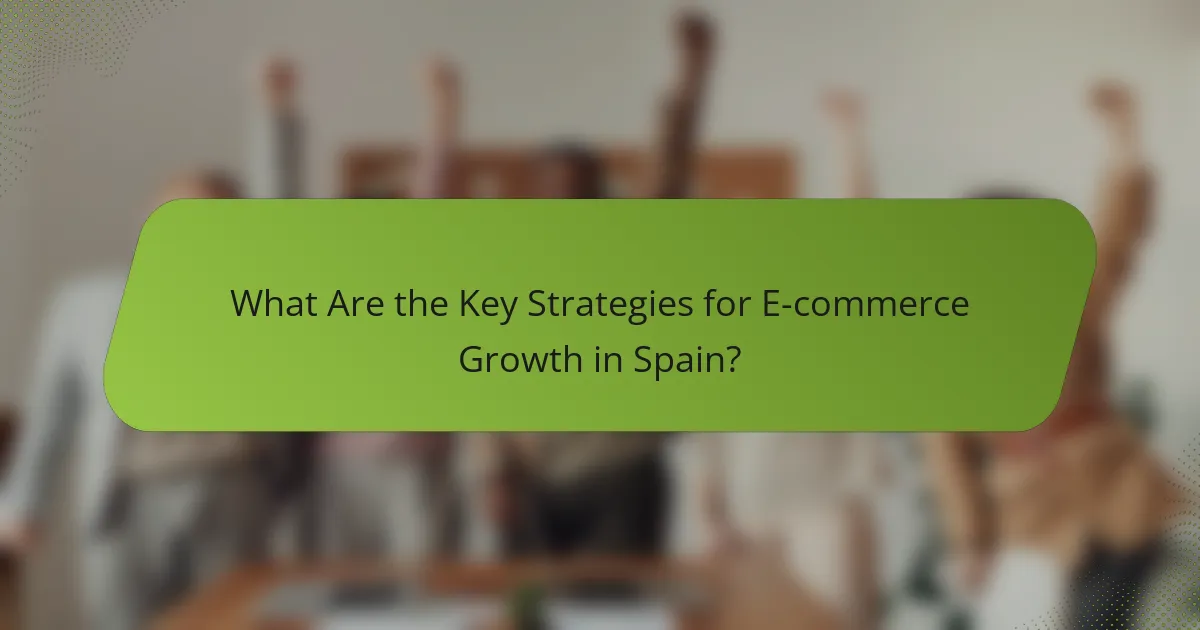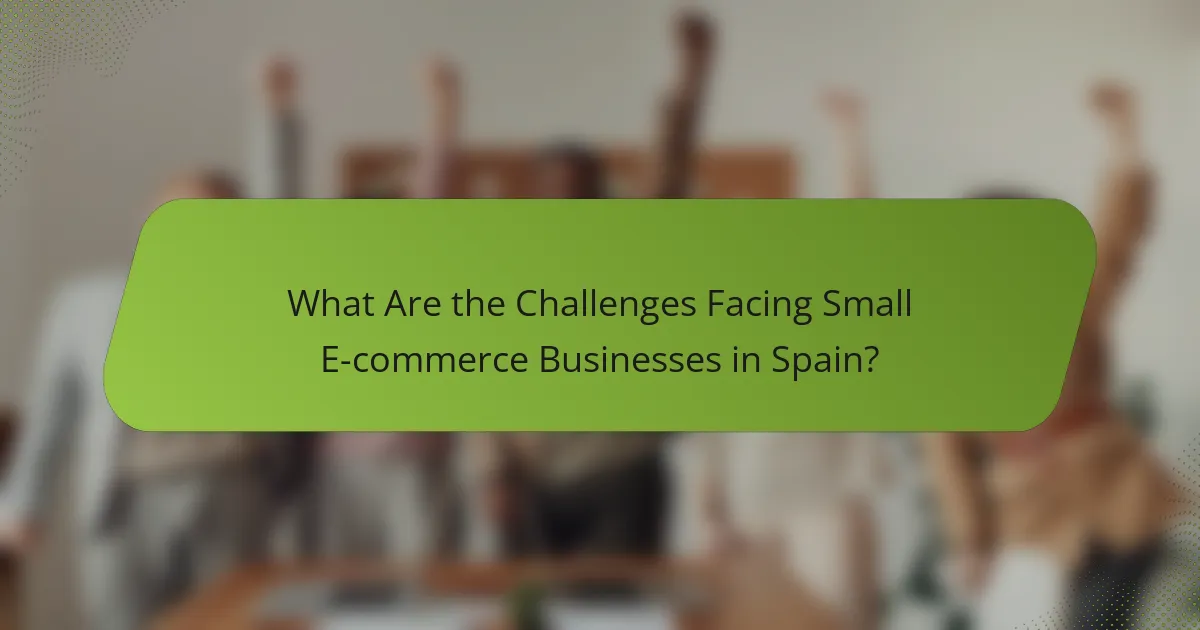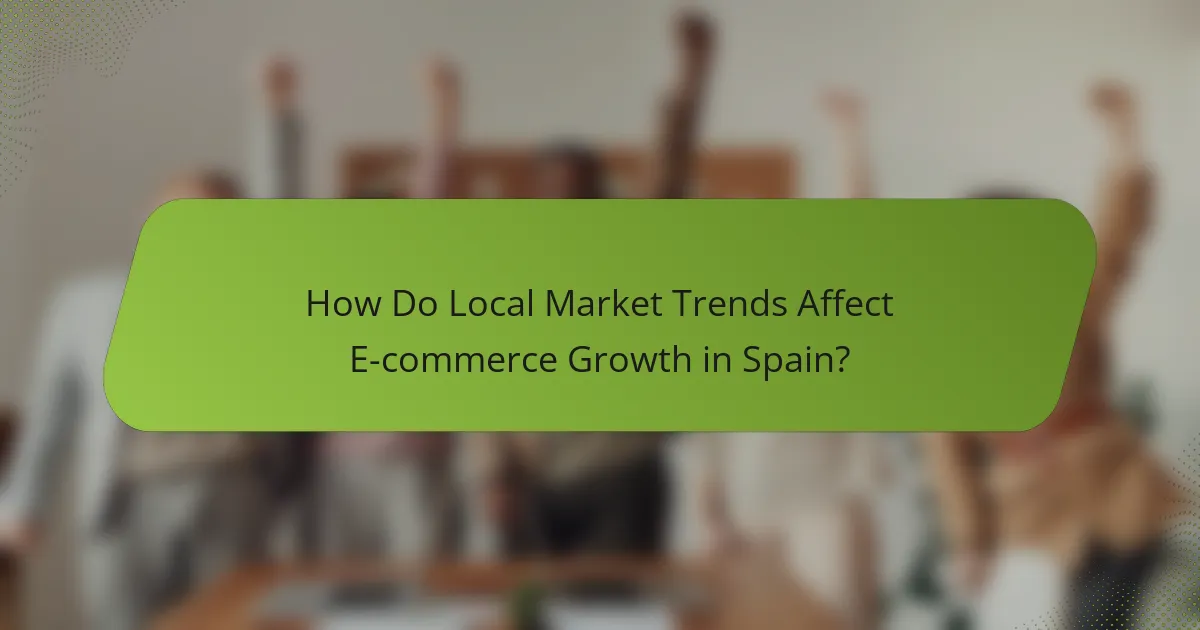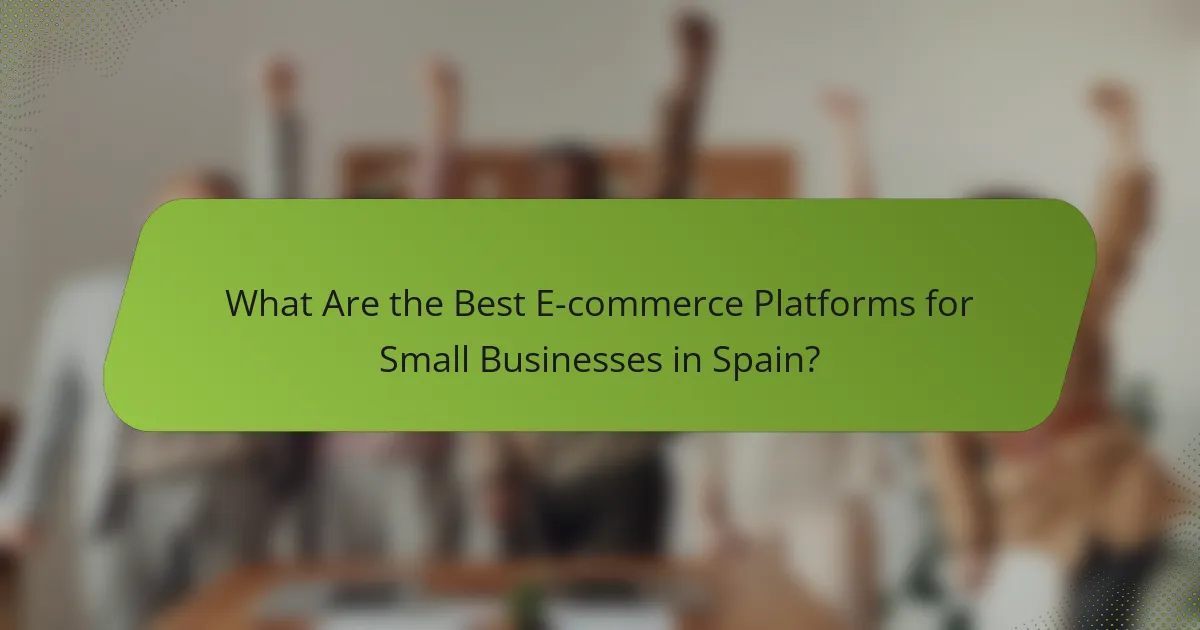The e-commerce landscape in Spain presents a promising opportunity for small businesses to expand their reach and enhance profitability. By leveraging digital marketing techniques and optimizing their online presence, these businesses can effectively engage customers and compete in a dynamic marketplace. Emphasizing website usability and local SEO will be crucial for attracting and retaining a loyal customer base.

What Are the Key Strategies for E-commerce Growth in Spain?
To achieve e-commerce growth in Spain, small businesses should focus on leveraging digital marketing techniques, optimizing their online presence, and enhancing customer engagement. Key strategies include utilizing social media, implementing SEO best practices, and adopting mobile commerce solutions.
Utilizing Social Media Marketing
Social media marketing is essential for reaching potential customers in Spain, where platforms like Instagram, Facebook, and TikTok are widely used. Businesses should create engaging content that resonates with their target audience, showcasing products and promotions effectively.
Consider running targeted ad campaigns that focus on specific demographics or interests. Regularly interacting with followers through comments and messages can also build a loyal customer base.
Implementing SEO Best Practices
Search engine optimization (SEO) is crucial for improving visibility in search results. Small businesses in Spain should focus on keyword research to identify relevant terms that potential customers are using to find products.
On-page SEO techniques, such as optimizing product descriptions and meta tags, can enhance search rankings. Additionally, building backlinks from reputable local websites can further boost online authority.
Leveraging Local Marketplaces
Utilizing local marketplaces like Wallapop and Amazon Spain can significantly increase visibility and sales. These platforms already have a large user base, making it easier for small businesses to reach customers without extensive marketing efforts.
Listing products on these marketplaces can also provide valuable insights into customer preferences and market trends, helping businesses tailor their offerings accordingly.
Enhancing Customer Experience
Providing an exceptional customer experience is vital for retaining customers and encouraging repeat purchases. This includes offering easy navigation on websites, fast shipping options, and responsive customer service.
Consider implementing features like live chat support and user-friendly return policies to address customer concerns promptly. Personalizing communications and offers can also enhance customer satisfaction.
Adopting Mobile Commerce Solutions
With the increasing use of smartphones for online shopping, adopting mobile commerce solutions is essential. Small businesses should ensure their websites are mobile-friendly and consider developing a dedicated mobile app for a seamless shopping experience.
Utilizing mobile payment options, such as Bizum or PayPal, can simplify the checkout process and cater to customer preferences. Regularly testing the mobile experience can help identify and resolve any usability issues.

How Can Small Businesses Optimize Their Online Presence in Spain?
Small businesses in Spain can optimize their online presence by focusing on website usability, local SEO, and effective content marketing strategies. These elements are crucial for attracting and retaining customers in a competitive digital marketplace.
Creating a User-Friendly Website
A user-friendly website is essential for small businesses to engage visitors and encourage conversions. Key aspects include intuitive navigation, fast loading times, and mobile responsiveness, as many users access sites via smartphones.
To enhance usability, consider using clear calls-to-action (CTAs) and ensuring that important information, like contact details and product descriptions, is easily accessible. Regularly testing the website’s functionality can help identify areas for improvement.
Utilizing Local SEO Techniques
Local SEO is vital for small businesses in Spain to attract nearby customers. This involves optimizing the website for local search terms, claiming Google My Business listings, and ensuring consistent NAP (Name, Address, Phone) information across platforms.
Incorporating local keywords into website content and meta tags can improve visibility in search results. Additionally, gathering customer reviews and engaging with local directories can further enhance local search rankings.
Engaging in Content Marketing
Content marketing allows small businesses to connect with their audience by providing valuable information. This can include blog posts, videos, and social media content that address customer needs and interests.
Regularly updating content not only boosts SEO but also positions the business as an authority in its field. Small businesses should focus on creating shareable content that resonates with their target market, fostering community engagement and brand loyalty.

What Are the Benefits of E-commerce for Small Businesses in Spain?
E-commerce offers significant advantages for small businesses in Spain, including broader market access, reduced costs, and valuable insights through data analytics. These benefits can enhance competitiveness and drive growth in an increasingly digital marketplace.
Increased Market Reach
Small businesses can expand their customer base beyond local markets by leveraging e-commerce platforms. This allows them to reach consumers across Spain and even internationally, increasing sales opportunities.
Utilizing online marketplaces like Amazon or local platforms such as Wallapop can help small businesses tap into a wider audience. Effective online marketing strategies, such as social media advertising, can further boost visibility and attract new customers.
Lower Operational Costs
E-commerce can significantly reduce operational costs compared to traditional retail. Businesses can save on expenses related to physical storefronts, such as rent and utilities, by operating online.
Additionally, e-commerce allows for streamlined inventory management and reduced staffing needs. Many small businesses find that using dropshipping models or third-party logistics can minimize overhead while maximizing efficiency.
Access to Data Analytics
With e-commerce, small businesses gain access to valuable data analytics that can inform decision-making. This data includes customer behavior, sales trends, and marketing effectiveness, allowing businesses to tailor their strategies.
Tools like Google Analytics or e-commerce platform dashboards provide insights that help optimize product offerings and enhance customer experiences. By regularly analyzing this data, businesses can make informed adjustments to improve sales and customer satisfaction.

What Are the Challenges Facing Small E-commerce Businesses in Spain?
Small e-commerce businesses in Spain face several challenges that can hinder their growth and success. Key issues include high competition, logistics and delivery problems, and the need for regulatory compliance.
High Competition
The e-commerce landscape in Spain is highly competitive, with numerous players vying for market share. Small businesses must differentiate themselves through unique products, exceptional customer service, or niche marketing strategies to stand out.
To effectively compete, small e-commerce retailers should consider leveraging social media and online advertising to reach their target audience. Building a strong brand presence can help attract and retain customers in a crowded market.
Logistics and Delivery Issues
Logistics and delivery are critical components of e-commerce that can significantly impact customer satisfaction. Small businesses often struggle with managing shipping costs and delivery times, which can lead to negative customer experiences.
Partnering with reliable logistics providers and offering multiple shipping options can enhance the delivery process. Additionally, providing clear information about shipping times and costs on the website can help set customer expectations and reduce complaints.
Regulatory Compliance
Small e-commerce businesses in Spain must navigate various regulations, including consumer protection laws, data privacy regulations, and tax obligations. Compliance with these regulations is essential to avoid legal issues and maintain customer trust.
Staying informed about local laws and regulations is crucial. Small businesses should consider consulting with legal experts or using compliance software to ensure they meet all necessary requirements, such as the General Data Protection Regulation (GDPR) for data handling.

How Do Local Market Trends Affect E-commerce Growth in Spain?
Local market trends significantly influence e-commerce growth in Spain by shaping consumer preferences and purchasing behaviors. Understanding these trends helps small businesses tailor their strategies to meet the evolving demands of Spanish consumers.
Shift Towards Sustainable Products
The demand for sustainable products is rising in Spain, driven by increased consumer awareness about environmental issues. Small businesses can capitalize on this trend by offering eco-friendly products, which not only attract environmentally conscious shoppers but also enhance brand loyalty.
To effectively tap into this market, consider sourcing materials that are biodegradable or recyclable and clearly communicating the sustainability of your products. Highlighting certifications or eco-labels can further strengthen your appeal to this growing demographic.
Growth of Mobile Shopping
Mobile shopping is rapidly expanding in Spain, with a significant portion of consumers using smartphones for online purchases. This trend underscores the importance of optimizing e-commerce platforms for mobile devices to enhance user experience and increase conversion rates.
Small businesses should ensure their websites are mobile-friendly, with fast loading times and easy navigation. Implementing mobile payment options, such as digital wallets, can also facilitate smoother transactions and cater to the preferences of mobile shoppers.

What Are the Best E-commerce Platforms for Small Businesses in Spain?
Small businesses in Spain can benefit from several robust e-commerce platforms that cater specifically to their needs. The best options include Shopify, WooCommerce, and PrestaShop, each offering unique features and pricing structures suitable for various business models.
Shopify
Shopify is a user-friendly platform ideal for small businesses looking to set up an online store quickly. It offers a range of customizable templates and integrated payment options, making it easy to manage sales. Monthly fees typically start around €29, which includes hosting and support.
One key advantage of Shopify is its scalability. As your business grows, you can easily upgrade your plan to access more features. However, be mindful of transaction fees if you choose third-party payment gateways.
WooCommerce
WooCommerce is a plugin for WordPress that allows small businesses to turn their existing websites into e-commerce stores. It is highly customizable and offers a wide range of extensions for added functionality. The software itself is free, but hosting and additional features can lead to costs ranging from €10 to €50 per month.
One of the main benefits of WooCommerce is its flexibility, allowing businesses to tailor their online presence. However, it requires some technical knowledge to set up and maintain effectively.
PrestaShop
PrestaShop is an open-source e-commerce solution that provides a high level of customization for small businesses. It is free to download, but users need to invest in hosting and potentially additional modules, which can range from €20 to several hundred euros depending on the features required.
This platform is particularly suitable for businesses with specific needs, as it allows for extensive modifications. However, the initial setup can be complex, so consider hiring a developer if you’re not tech-savvy.
